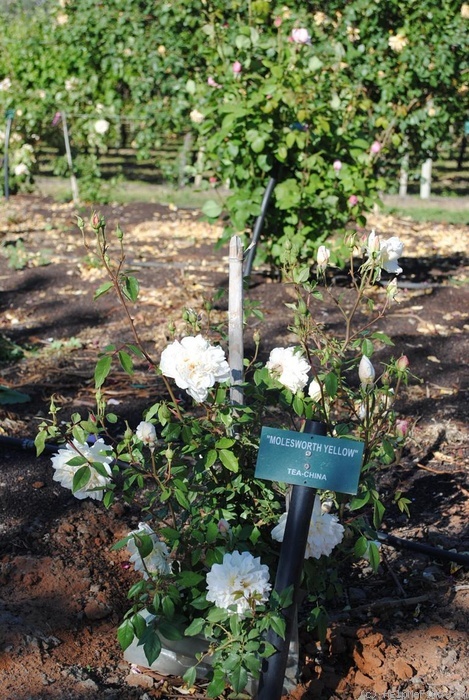|
|
"Molesworth Yellow China Tea" rose Description

Photo courtesy of Ozoldroser
Class:
Found Rose, China / Bengale, Tea.
Bloom:
Cream. Pale creamy yellow, carmine spotting or shading at base outside, deep yellow at base inside, paler reverse. Firm textured, folded petals, crinkle edged or fluted, stamens & pistil visible. [Pinkish in the center when young, ageing to yellowish.]. Strong fragrance. 91 to 94 petals. Average diameter 2.75". Small, double (17-25 petals), borne mostly solitary, in small clusters bloom form. Continuous (perpetual) bloom throughout the season.
Habit:
Short, bushy. Small, glossy, medium green foliage.
Height: up to 39" (up to 100cm).
Patents:
Patent status unknown (to HelpMeFind).
Notes:
Bloom. Colour similar to 'Safrano'.
Receptacle: small, slender, mostly smooth, some glands at base.
Sepals: Long leafy, glandular sepals.
Foliage: 5 leaflets, long ovate, pointed, secondary vein indenting. Rachis: prickles underneath.
Bush Twiggy growth
Not 'Arethusa' <1817 which has wider petals which twist right back
Not 'Mme. Caroline Kuster' as that rose was said to be 8' x 8'.
Still to be considered are:
'Ducher' 1869
'Hyménée' 1820
'Le Pactole' <1837
'Primrose Queen' <1918
'Park's Yellow Tea-Scented China' 1824
'Rosa semperflorens à fleurs blanches rosées' <1815
[The "Molesworth Yellow China" was found by Rob Peace in the late 1990s in an old Victorian garden where 'Anais Segales', ?Niphetos', 'La France' and 'Mrs. A. R. Waddell' were also growing. He also noted a similar bush at Rookwood and took cuttings of this at one time. Rob recognised similarities between the "Molesworth Yellow China" and descriptions of the original 'Parks' Yellow Tea-scented China' - the colour, habit, finer China-like growth and recurrence. It is believed that John Nieuwesteeg put it on the market later as "Not Parks' Yellow".]
|